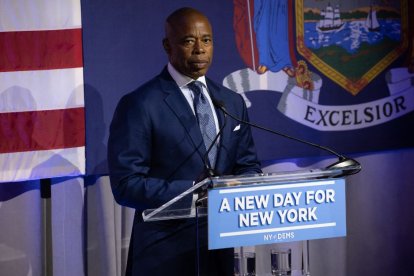New York City approves two bills for slavery reparations
The City Council approves the creation of a commission and task force to establish "a process of truth, healing and reconciliation."

Eric Adams, in a file photo
The New York City Council, controlled by a Democratic supermajority, passed two bills addressing slavery reparations in the city. Now, a commission and task force will be created to establish "a process of truth, healing and reconciliation."
Councilmembers Crystal Hudson and Farah Louis, supporters of the two bills, celebrated the approval of the new legislation, which will take effect immediately. "We take a crucial step toward justice and equity," they assured. A stance that was followed by the council's statement:
"Today, the New York City Council voted to pass legislation establishing municipal efforts to acknowledge and address the legacy and impact of slavery and racial injustices in New York City. The package of legislation would establish a Truth, Healing and Reconciliation process on slavery within New York City (which had one of the highest rates of slave ownership in the country in the 1700s), a reparations study, informational signs at the City’s first slave market, and a taskforce to consider the creation of a 'freedom trail' commemorating abolitionist movement and Underground Railroad sites."
Opposition criticizes the initiative
The statement explains that the commission will be tasked with "establishing facts about slavery in New York City and its ongoing legacy, protecting and recognizing affected individuals and communities, and recommending changes for government and institutions to avoid the perpetuation and repetition of the injustices of slavery's legacy." In remarks picked up by Fox, Hudson added that the new legislation "will identify racist, anti-Black policies at the foundation of our city’s institutions, and it will yield material solutions to address these foundational cracks."
Minority Leader Joseph Borelli, one of the 8 voters against the two bills, assured The New York Post that "I'll move before I pay. If you can introduce me to a single New Yorker who has ever owned a slave, I'll be happy to consider it. Until then, I will not pay one cent as reparations for a harm I did not cause, condone, or ever participate in."
RECOMMENDATION





















